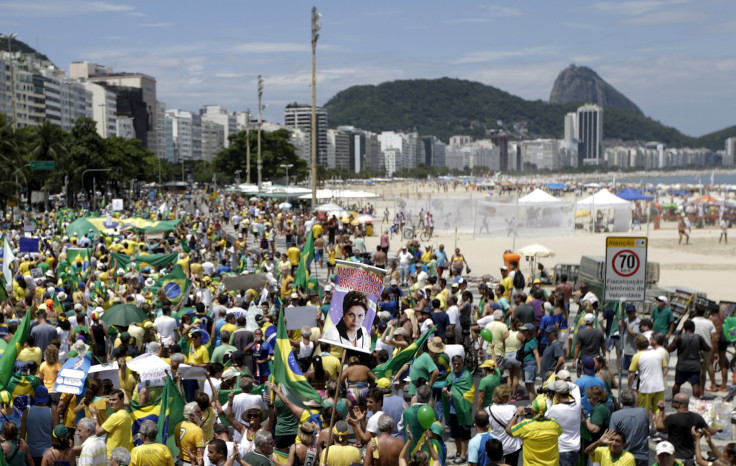Brazilians Rally To Demand Rousseff's Removal

SAO PAULO (Reuters) — Thousands of Brazilians took to the streets of major cities Sunday to demand President Dilma Rousseff's ouster, but the first nationwide protests since formal impeachment proceedings began were smaller than similar events earlier this year. Police did not provide official estimates for turnout, although television stations said there were about 6,000 in São Paulo and slightly fewer in Rio de Janeiro and Brasília.
"This is just a warm-up; there will be a huge mobilization in January," said Paloma Morena, a 35-year-old chemist on São Paulo's most famous street, Avenida Paulista.
Hundreds of thousands took to the streets in August, and up to a million Brazilians were estimated to have turned out in March. A large-scale mobilization could increase pressure on lawmakers to vote for Rousseff's impeachment.
Lower House Speaker Eduardo Cunha opened impeachment proceedings on Dec. 2, agreeing that Congress should consider opposition allegations that Rousseff violated budget laws to increase spending during her 2014 re-election campaign.
But many Brazilians are more upset about the worst economic recession in at least 25 years and a corruption scandal at state-run oil firm Petrobras that has ensnared many of her allies. Rousseff is not under investigation, but many Brazilians question how she could not have known about the corruption as she was chairwoman of Petrobras from 2003 to 2010.
"Inflation is through the roof, unemployment is shockingly high and we get nothing for the amount of taxes we pay," said Andre Patrao, a 47-year-old economist demonstrating in Rio's posh Copacabana neighborhood.
Currently the opposition is not thought to have the votes to impeach Rousseff, who denies mishandling public accounts and has pledged to fight impeachment in order to finish her second term.
If a house committee decides in favor of impeachment, the process will go to a full vote on the house floor, where the opposition needs two-thirds of the votes to begin a 180-day impeachment trial in the Senate. During that trial, Rousseff would be suspended and replaced by Vice President Michel Temer.
The Supreme Court has suspended impeachment proceedings until it rules on the validity of a secret ballot that selected the members of the house committee. Meanwhile Cunha, a former ally who broke with Rousseff, is facing formal charges himself in the Petrobras investigation over allegations he took bribes.
Brazil's largest union federation, the CUT, has called a protest to support Rousseff on Dec. 16.
© Copyright IBTimes 2024. All rights reserved.





















